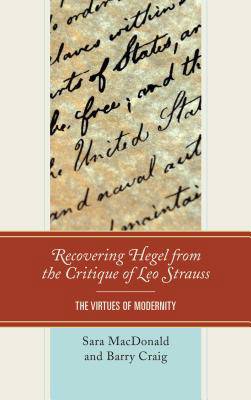
- Afhalen na 1 uur in een winkel met voorraad
- Gratis thuislevering in België vanaf € 30
- Ruim aanbod met 7 miljoen producten
- Afhalen na 1 uur in een winkel met voorraad
- Gratis thuislevering in België vanaf € 30
- Ruim aanbod met 7 miljoen producten
Zoeken
Recovering Hegel from the Critique of Leo Strauss
The Virtues of Modernity
Sara MacDonald, Barry Craig
Paperback | Engels
€ 88,95
+ 177 punten
Uitvoering
Omschrijving
Recovering Hegel from the Critique of Leo Strauss provides a study unique in its focus on Leo Strauss's reading of Hegel. While MacDonald and Craig find value in Strauss's thought, they argue that his pessimism concerning modernity lies in a misunderstanding of both modernity's greatest philosophical advocate, G.W.F. Hegel, and modernity's virtues.
Specificaties
Betrokkenen
- Auteur(s):
- Uitgeverij:
Inhoud
- Aantal bladzijden:
- 164
- Taal:
- Engels
Eigenschappen
- Productcode (EAN):
- 9781498550406
- Verschijningsdatum:
- 14/11/2016
- Uitvoering:
- Paperback
- Formaat:
- Trade paperback (VS)
- Afmetingen:
- 150 mm x 229 mm
- Gewicht:
- 226 g

Alleen bij Standaard Boekhandel
+ 177 punten op je klantenkaart van Standaard Boekhandel
Beoordelingen
We publiceren alleen reviews die voldoen aan de voorwaarden voor reviews. Bekijk onze voorwaarden voor reviews.








